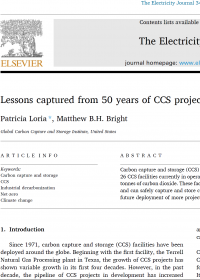Resources
Publications
Our publications, reports and research library hosts over 500 specialist reports and research papers on all topics associated with CCS.
View our Publication Library Disclaimer.
Filter by
Fifty years ago this summer in the small town of Terrell, Texas, construction began on a new type of technological innovation called carbon capture and storage (CCS). The facility that would host this novelty was a natural gas processing plant that used pre-combustion carbon dioxide capture technology to separate anthropogenic CO2 from its natural gas processing steps before transporting it to an oil field for enhanced oil recovery (EOR) and storage. From that first facility to today, the term “CCS” has grown to encompass a global industry, with 26 CCS facilities currently in operation around the world that have safely captured and stored 300 million metric tonnes of CO2.
In a new paper published in Volume 34, Issue 7 of the Electricity Journal, Lessons captured from 50 years of CCS projects, authors Patricia Loria and Matt Bright give a history of the CCS industry and examine the lessons learned from the deployment of the current 26 operational facilities. Project developers contribute their insights, and the main opportunities and challenges are condensed to help guide the deployment of more CCS projects around the globe. Moreover, the paper highlights the work of the Global CCS Institute over the past eleven years in tracking projects through its CO2RE database. The most important conclusion is that the 26 operational CCS facilities demonstrate that the technology has successfully been deployed to scale and can safely capture and store CO2 critical for the success of any global climate change mitigation strategy.
The Global CCS Institute was invited to contribute this article to a special August, 2021 issue of the Electricity Journal focusing on CCS. The issue comprises 7 other articles from leading NGOs and researchers in the field of CCS.
Disclaimer
The content within the Global CCS Institute Publications, Reports and Research Library is provided for information purposes only. We make every effort and take reasonable care to keep the content of this section up-to-date and error-free. However, we make no claim as to its accuracy, currency or reliability.
Content and material featured within this section of our website includes reports and research published by third parties. The content and material may include opinions and recommendations of third parties that do not reflect those held by the Global CCS Institute.
Scaling up the CCS Market to Deliver Net-Zero Emissions
20th April 2020
Organisation(s): Global CCS Institute
Topic(s): Carbon capture and storage (CCS), CCS facilities, Policy law and regulation
Understanding how the CCS market is likely to develop over the coming years is of interest to a wide range of stakeholders. It can help inform the timing and design of policies introduced by governments, the scale of the market for potential investors, and the challenges associated with meeting long-term climate targets.
This report aims to inform the discussion on these topics by providing an overview of the near-term and longer-term developments in the CCS market.
It reviews the current CCS facility pipeline, and how that could change in the next few years given project lead-in times. It then considers how this compares to projections of the number of CCS facilities needed to meet long-term climate goals. Throughout the report the number of CCS facilities deployed is used as a proxy for the size of the CCS market.
Disclaimer
The content within the Global CCS Institute Publications, Reports and Research Library is provided for information purposes only. We make every effort and take reasonable care to keep the content of this section up-to-date and error-free. However, we make no claim as to its accuracy, currency or reliability.
Content and material featured within this section of our website includes reports and research published by third parties. The content and material may include opinions and recommendations of third parties that do not reflect those held by the Global CCS Institute.

